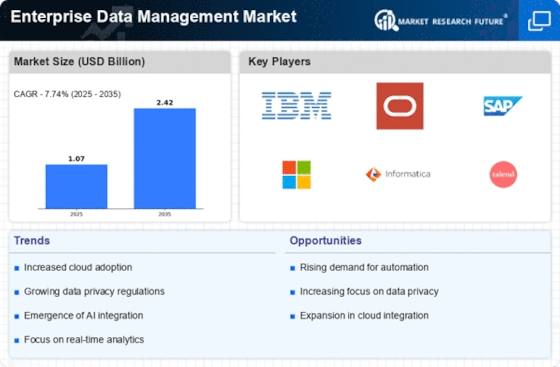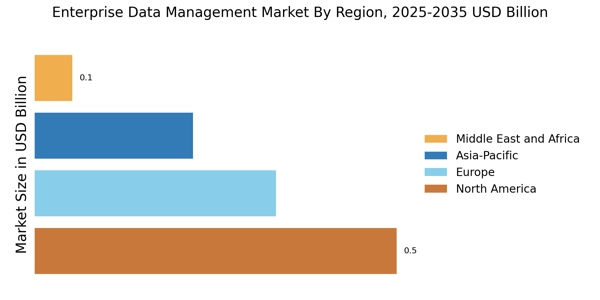Regulatory Compliance and Data Privacy
In the context of the Enterprise Data Management Market, regulatory compliance and data privacy have emerged as critical drivers. With the implementation of stringent data protection regulations, such as the General Data Protection Regulation (GDPR), organizations are compelled to adopt comprehensive data management practices. This necessity not only ensures compliance but also fosters consumer trust. The market is witnessing a shift towards solutions that facilitate data lineage, auditing, and reporting capabilities. As businesses navigate the complexities of regulatory landscapes, the demand for enterprise data management solutions that address compliance requirements is expected to rise. This trend indicates a growing recognition of the importance of data stewardship in maintaining organizational integrity and reputation.
Expansion of Data Ecosystems and Partnerships
The expansion of data ecosystems and partnerships is a notable trend within the Enterprise Data Management Market. Organizations are increasingly collaborating with technology providers, data vendors, and analytics firms to enhance their data management capabilities. This collaborative approach enables businesses to access a broader range of data sources and analytics tools, fostering innovation and agility. As organizations seek to create interconnected data environments, the demand for enterprise data management solutions that facilitate seamless integration and interoperability is expected to rise. This trend suggests that the Enterprise Data Management Market is evolving towards a more collaborative landscape, where partnerships play a crucial role in driving data-driven initiatives.
Rising Demand for Data-Driven Decision Making
The Enterprise Data Management Market is experiencing a notable surge in demand for data-driven decision making. Organizations are increasingly recognizing the value of data as a strategic asset, leading to investments in data management solutions. According to recent estimates, the market is projected to grow at a compound annual growth rate of approximately 12% over the next five years. This growth is driven by the need for businesses to leverage data analytics for competitive advantage. As companies strive to enhance operational efficiency and customer engagement, the emphasis on effective data management becomes paramount. Consequently, the Enterprise Data Management Market is positioned to benefit from this trend, as organizations seek to implement robust data governance frameworks and analytics capabilities.
Growing Importance of Data Quality and Integrity
Data quality and integrity are becoming paramount in the Enterprise Data Management Market. Organizations are increasingly aware that poor data quality can lead to misguided decisions and operational inefficiencies. As a result, there is a heightened focus on implementing data quality frameworks and tools that ensure accurate, consistent, and reliable data. The market is witnessing a shift towards solutions that offer data cleansing, validation, and enrichment capabilities. This trend indicates a growing recognition of the need for organizations to invest in data quality management as a foundational element of their data strategy. Consequently, the Enterprise Data Management Market is likely to see increased demand for solutions that prioritize data integrity and quality assurance.
Increased Adoption of Artificial Intelligence and Machine Learning
The integration of artificial intelligence (AI) and machine learning (ML) technologies is significantly influencing the Enterprise Data Management Market. Organizations are increasingly leveraging these advanced technologies to enhance data processing, analysis, and decision-making capabilities. AI and ML facilitate the automation of data management tasks, enabling organizations to derive insights from vast datasets more efficiently. As a result, the market is projected to witness substantial growth, with AI-driven data management solutions gaining traction. This trend suggests that organizations are not only seeking to manage data but also to harness its potential through intelligent analytics. The Enterprise Data Management Market is likely to evolve as businesses prioritize innovative solutions that incorporate AI and ML functionalities.


















